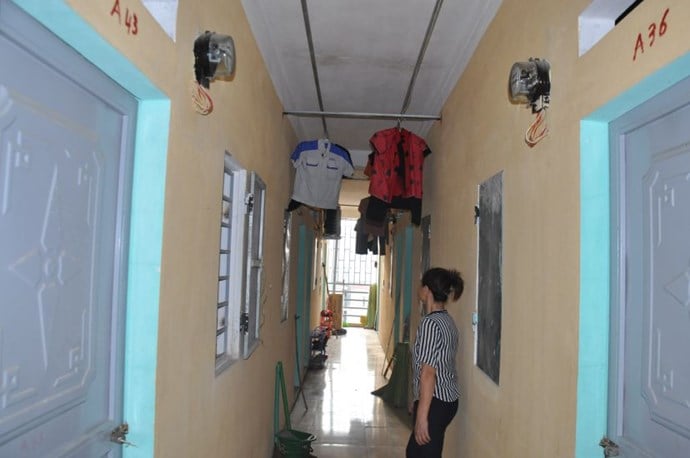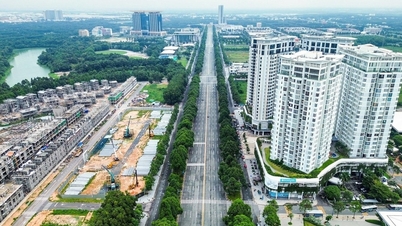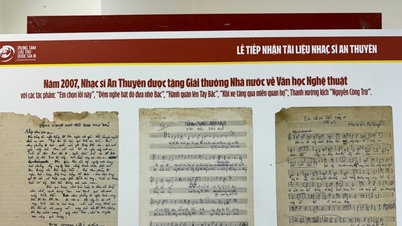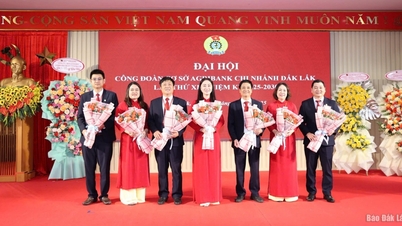(CLO) The fact that the market only has luxury housing and no more affordable housing leads to the unbalanced and unsustainable development of the Ho Chi Minh City housing market, like an upside-down pyramid model.
The Ho Chi Minh City Real Estate Association (HoREA) has just sent a document to the Prime Minister and the Ministry of Construction on a number of solutions to promote social housing and develop a healthy and sustainable real estate market.
According to HoREA's forecast, in 2025, the real estate market in Ho Chi Minh City and the whole country will still face many difficulties. This could be a pivotal year for the transition to a new phase of healthier and more sustainable development from 2026 onwards.

Ho Chi Minh City real estate is like an upside-down pyramid model. (Photo: DCS)
Mr. Le Hoang Chau, Chairman of HoREA, stated clearly: The housing market in Ho Chi Minh City in 2024 will continue to have a shortage of housing project supply, especially affordable commercial housing with a selling price of less than 30 million VND/m2 and a severe shortage of social housing.
In contrast, the high-end housing segment from 2020 to 2023 continuously accounts for the overwhelming majority of the market with about 70% of the number of houses launched on the market each year. Mr. Chau said that this issue is worrying.
“The fact that the market only has luxury housing and no affordable housing has led to the unbalanced and unsustainable development of the Ho Chi Minh City housing market, like an upside-down pyramid model,” said Mr. Chau.
Also according to the Chairman of HoREA: Housing prices have increased continuously over the past years and are still at very high prices, such as the price of luxury apartments in 2024 reaching 90 million VND/m2, an average of about 9.7 billion VND/apartment, exceeding the financial capacity of the majority of middle-income and low-income urban people.
Besides, the results of social housing development in the city from 2021 to 2024 are too modest, not reaching the set target.
Hundreds of the above projects are mainly stuck in legal problems or some projects are due to incompetent investors. If they are not resolved soon to restart, it will be a waste of land resources, a loss of state budget revenue, difficulties for businesses, and a lack of housing supply, making it difficult for housing prices to decrease in the short term.
Faced with this reality, Mr. Chau proposed that the Ministry of Construction consider submitting to the Government and the National Assembly Standing Committee to consider submitting to competent authorities for consideration to allow the National Assembly to issue a "Pilot Resolution on specific mechanisms and policies for social housing development".
The Chairman of HoREA also proposed that the Ministry of Construction consider submitting to the Prime Minister and competent authorities to consider supplementing the Law on Value Added Tax and the Law on Corporate Income Tax, which stipulates: "In the case of building social housing for rent, the value added tax rate is 3% and the corporate income tax rate is 6%".
“Having attractive tax policies can encourage businesses to invest in building social housing for rent only,” Mr. Chau said.
In addition, HoREA proposed that the Ministry of Construction consider submitting to the Prime Minister for consideration to add to Decree 100 the regulation that recognizes long-term rental houses by month or year as a type of social housing, as "individual housing" invested in and built by individuals and households for rent.
Because the tenants are mainly workers, laborers, and immigrants, having this additional mechanism helps landlords enjoy preferential policies on credit, value added tax, and personal income tax.
Typically, Ho Chi Minh City has about 60,470 people running long-term rental businesses with a total of 560,000 rooms, providing rental accommodation for 1.4 million people.
However, currently, due to lack of support under the social housing policy, long-term rental house owners must pay a "contractual" tax of 7% of their revenue from long-term accommodation services, including 5% value added tax and 2% personal income tax as prescribed, similar to mini-hotel owners also paying a "contractual" tax of 7% of their revenue from "short-term accommodation services" which is unreasonable.
If long-term rental housing is recognized as a type of social housing, the owners of these rental housing will enjoy preferential credit and tax policies such as a 50% reduction in VAT and personal income tax for social housing.
“Long-term rental landlords only have to pay a lump-sum tax of 3.5% on revenue and can also get preferential loans to build, renovate or repair boarding houses to serve tenants,” said Mr. Chau.
Source: https://www.congluan.vn/bat-dong-san-tp-hcm-nhu-mo-hinh-kim-tu-thap-bi-lon-nguoc-dau-post333833.html




![[Photo] Cutting hills to make way for people to travel on route 14E that suffered landslides](https://vphoto.vietnam.vn/thumb/1200x675/vietnam/resource/IMAGE/2025/11/08/1762599969318_ndo_br_thiet-ke-chua-co-ten-2025-11-08t154639923-png.webp)






































![[Video] Hue Monuments reopen to welcome visitors](https://vphoto.vietnam.vn/thumb/402x226/vietnam/resource/IMAGE/2025/11/05/1762301089171_dung01-05-43-09still013-jpg.webp)



































































Comment (0)